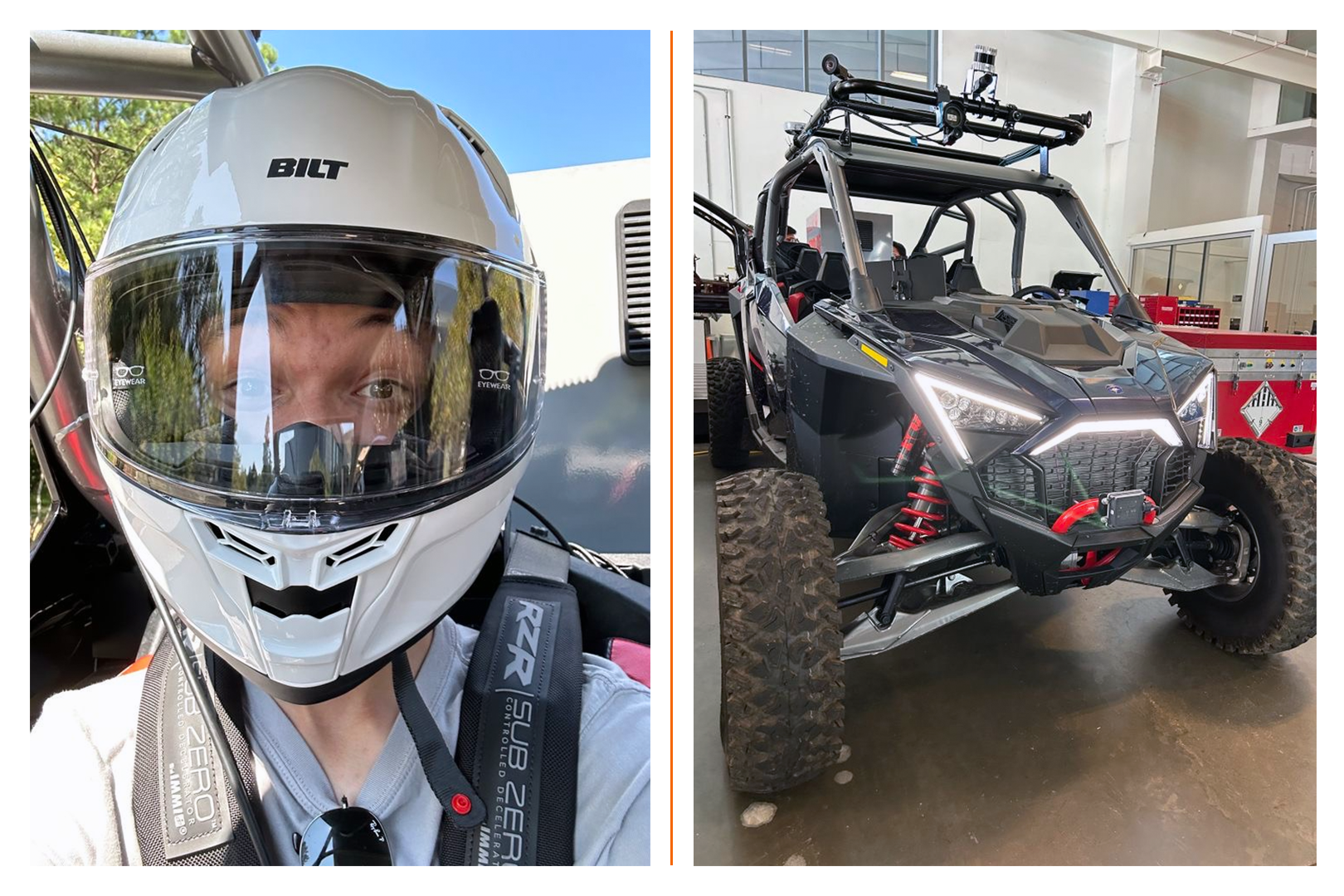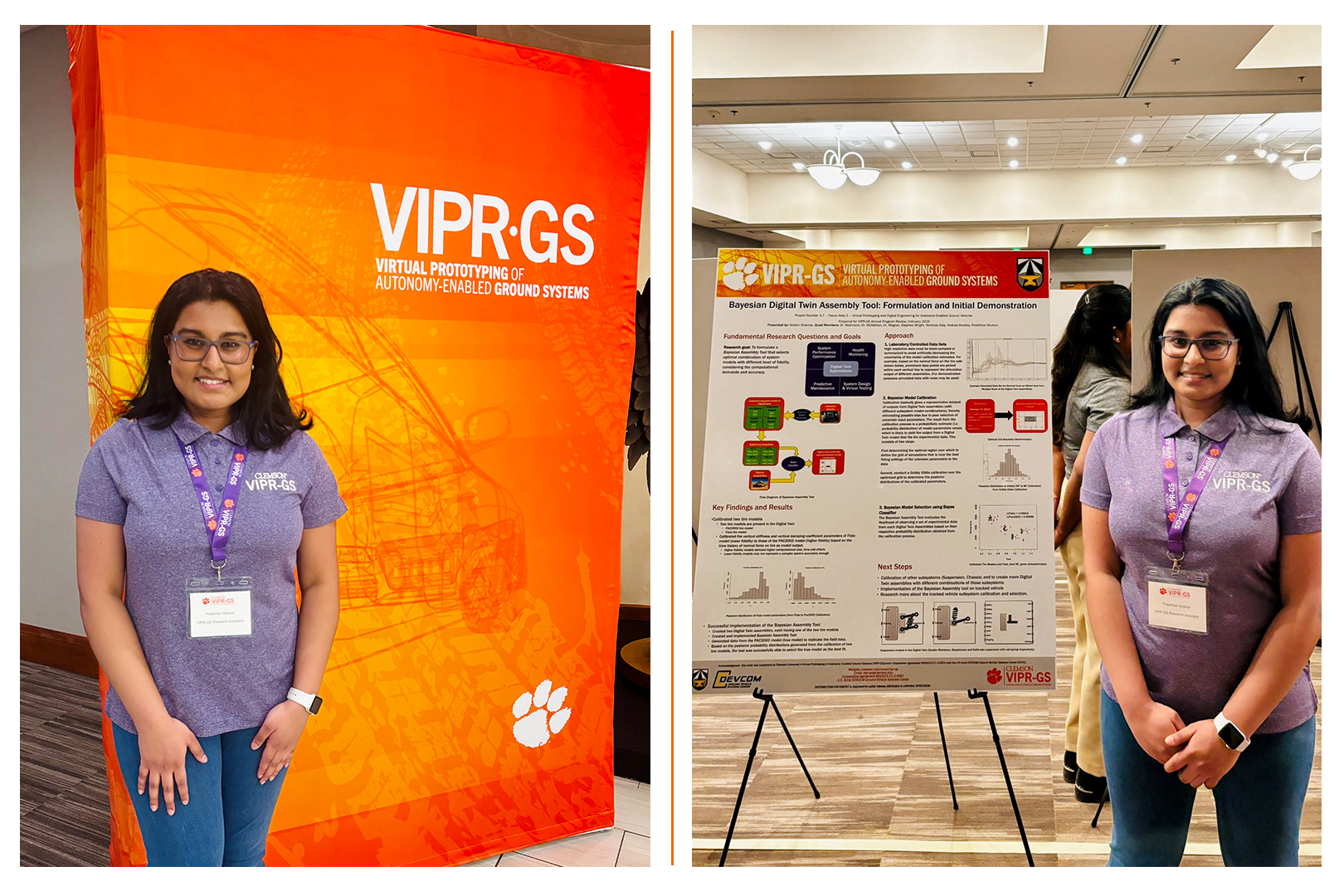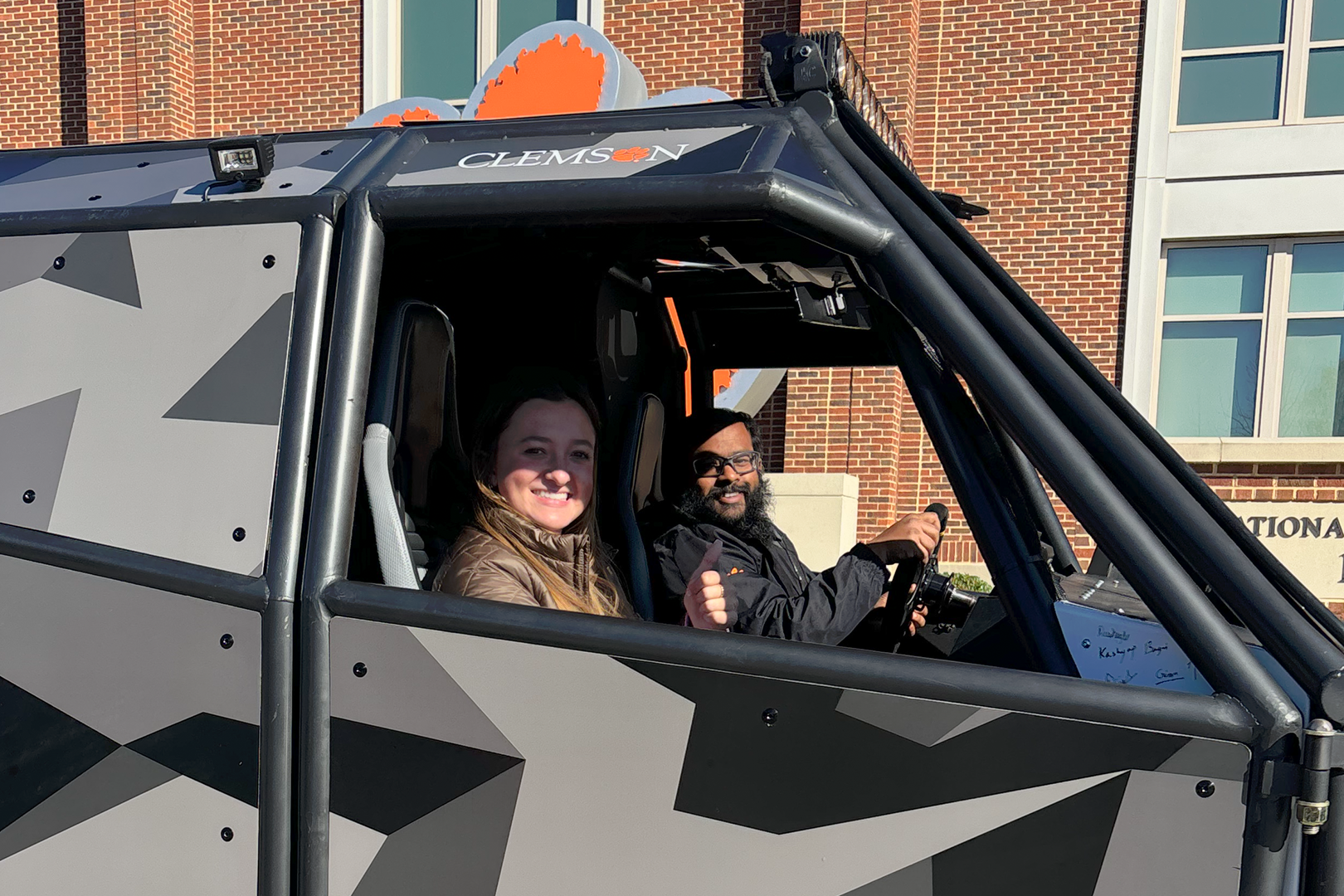VIPR-GS Highlights Impactful Internship Experience For Students
August 28, 2025
By VIPR-GS Intern Kate DeStefano
VIPR-GS Highlights Impactful Internship Experience For Students
August 28, 2025
By VIPR-GS Intern Kate DeStefano
The Virtual Prototyping of Autonomy-Enabled Ground Systems Research Center (VIPR-GS) and Clemson University are celebrating the achievements of its recent fall and spring semester Honors College interns who worked closely with faculty members on advanced research projects involving autonomy, robotics, coding, and engineering.
These internships have provided the students involved with a unique opportunity to gain real-world experience in an academic and research setting. Each project helps to prompt VIPR-GS’s ongoing mission: Create advanced tools for virtual prototyping and agile physical prototyping, driven by research breakthroughs in autonomous off-road vehicles and next-generation propulsion technologies. The initiative also focuses on intelligent fleet energy management, enabling more efficient, adaptable, and sustainable development and deployment of off-road vehicle systems.
The interns collaborated directly with professors on projects involving CAD programs, coding through Python, autonomy kits, creating models, learning sensor setups, and many more exciting and innovative skills.
Jacob Davis, one of the interns that was chosen to work through this program, describes his time as “dynamic and fast-paced”. He said, “As a part of my VIPR internship, I joined Yunyi Jia’s CRA (Collaborative Robotics and Automation) Lab. Over the past semester I have worked on a project involving research for an autonomy kit solution for an industry partner.” Through many hours of research and testing Jacob, accompanied by graduate students in Jia’s lab, was able to “collect and set up a robust array of sensors on the autonomous RZR vehicle for testing autonomy algorithms.”

Jacob Davis validating research in a Polaris RZR equipped for autonomy.
This internship program was designed to prepare students for careers in research, engineering, modeling, simulations, and autonomy. By working side-by-side with Clemson University researchers, interns not only deepened their technical knowledge but also developed soft skills like communication, time-management, and problem-solving.
Katelynn Hughes, an intern who worked closely with Apparao Rao and Greg Mocko to develop her coding and modeling skills said that this opportunity has allowed her to “create a clearer idea of what career I wanted to pursue with my degree.” Internships like this are more than just resume builders, they provide hands-on experience, foster mentorship, and allow students to see firsthand how their academic learning applies in high-impact research environments. Among many things, Katelynn learned how to develop code using Python, Siemens NX, and creating assemblies in different CAD programs.
Throughout the school year, interns also got the opportunity to participate in lab meetings and progress presentations. These experiences specifically help to bridge the gap between classroom learning and practical application. Jeff Fine, Senior Associate Dean of the Clemson University Honors College, said “Internships are excellent opportunities for students to expand their networks and explore potential careers. Our top students and alumni often talk about how an internship experience helped them figure out what they want to do or in some cases what they don’t want to do. Both outcomes are invaluable for students to find their passion and their path.”

Preethika Yetukuri presented research findings at the VIPR-GS Research Center annual review.
According to The Princeton Review, Clemson University was ranked 11th nationally for “best public schools for internship opportunities.” This recognition highlights Clemson’s strong focus on experiential learning, career readiness, and its commitment to connecting students with real-world professional experiences that prepare them for life after graduation.
As the program looks ahead, VIPR-GS is committed to expanding internship opportunities and strengthening partnerships across disciplines and institutions to support future cohorts of student researchers.
Learn more about the VIPR-GS Research Center here.
Acknowledgment: This work was supported by Clemson University’s Virtual Prototyping of Autonomy Enabled Ground Systems (VIPR-GS), under Cooperative Agreement W56HZV-21-2-0001 with the US Army DEVCOM Ground Vehicle Systems Center (GVSC).

The Virtual Prototyping of Autonomy-Enabled Ground Systems Research Center Center (VIPR-GS) and Clemson University are celebrating the achievements of its recent fall and spring semester Honors College interns who worked closely with faculty members on advanced research projects involving autonomy, robotics, coding, and engineering.
These internships have provided the students involved with a unique opportunity to gain real-world experience in an academic and research setting. Each project helps to prompt VIPR-GS’s ongoing mission: Create advanced tools for virtual prototyping and agile physical prototyping, driven by research breakthroughs in autonomous off-road vehicles and next-generation propulsion technologies. The initiative also focuses on intelligent fleet energy management, enabling more efficient, adaptable, and sustainable development and deployment of off-road vehicle systems.
The interns collaborated directly with professors on projects involving CAD programs, coding through Python, autonomy kits, creating models, learning sensor setups, and many more exciting and innovative skills.
Jacob Davis, one of the interns that was chosen to work through this program, describes his time as “dynamic and fast-paced”. He said, “As a part of my VIPR internship, I joined Yunyi Jia’s CRA (Collaborative Robotics and Automation) Lab. Over the past semester I have worked on a project involving research for an autonomy kit solution for an industry partner.” Through many hours of research and testing Jacob, accompanied by graduate students in Jia’s lab, was able to “collect and set up a robust array of sensors on the autonomous RZR vehicle for testing autonomy algorithms.”

Jacob Davis validating research in a Polaris RZR equipped for autonomy.
This internship program was designed to prepare students for careers in research, engineering, modeling, simulations, and autonomy. By working side-by-side with Clemson University researchers, interns not only deepened their technical knowledge but also developed soft skills like communication, time-management, and problem-solving.
Katelynn Hughes, an intern who worked closely with Apparao Rao and Greg Mocko to develop her coding and modeling skills said that this opportunity has allowed her to “create a clearer idea of what career I wanted to pursue with my degree.” Internships like this are more than just resume builders, they provide hands-on experience, foster mentorship, and allow students to see firsthand how their academic learning applies in high-impact research environments. Among many things, Katelynn learned how to develop code using Python, Siemens NX, and creating assemblies in different CAD programs.
Throughout the school year, interns also got the opportunity to participate in lab meetings and progress presentations. These experiences specifically help to bridge the gap between classroom learning and practical application. Jeff Fine, Senior Associate Dean of the Clemson University Honors College, said “Internships are excellent opportunities for students to expand their networks and explore potential careers. Our top students and alumni often talk about how an internship experience helped them figure out what they want to do or in some cases what they don’t want to do. Both outcomes are invaluable for students to find their passion and their path.”

Preethika Yetukuri presented research findings at the VIPR-GS Research Center annual review.
According to The Princeton Review, Clemson University was ranked 11th nationally for “best public schools for internship opportunities.” This recognition highlights Clemson’s strong focus on experiential learning, career readiness, and its commitment to connecting students with real-world professional experiences that prepare them for life after graduation.
As the program looks ahead, VIPR-GS is committed to expanding internship opportunities and strengthening partnerships across disciplines and institutions to support future cohorts of student researchers.
Learn more about the VIPR-GS Research Center here.
Acknowledgment: This work was supported by Clemson University’s Virtual Prototyping of Autonomy Enabled Ground Systems (VIPR-GS), under Cooperative Agreement W56HZV-21-2-0001 with the US Army DEVCOM Ground Vehicle Systems Center (GVSC).

The Virtual Prototyping of Autonomy-Enabled Ground Systems Research Center (VIPR-GS) and Clemson University are celebrating the achievements of its recent fall and spring semester Honors College interns who worked closely with faculty members on advanced research projects involving autonomy, robotics, coding, and engineering.
These internships have provided the students involved with a unique opportunity to gain real-world experience in an academic and research setting. Each project helps to prompt VIPR-GS’s ongoing mission: Create advanced tools for virtual prototyping and agile physical prototyping, driven by research breakthroughs in autonomous off-road vehicles and next-generation propulsion technologies. The initiative also focuses on intelligent fleet energy management, enabling more efficient, adaptable, and sustainable development and deployment of off-road vehicle systems.
The interns collaborated directly with professors on projects involving CAD programs, coding through Python, autonomy kits, creating models, learning sensor setups, and many more exciting and innovative skills.
Jacob Davis, one of the interns that was chosen to work through this program, describes his time as “dynamic and fast-paced”. He said, “As a part of my VIPR internship, I joined Yunyi Jia’s CRA (Collaborative Robotics and Automation) Lab. Over the past semester I have worked on a project involving research for an autonomy kit solution for an industry partner.” Through many hours of research and testing Jacob, accompanied by graduate students in Jia’s lab, was able to “collect and set up a robust array of sensors on the autonomous RZR vehicle for testing autonomy algorithms.”

Jacob Davis validating research in a Polaris RZR equipped for autonomy.
This internship program was designed to prepare students for careers in research, engineering, modeling, simulations, and autonomy. By working side-by-side with Clemson University researchers, interns not only deepened their technical knowledge but also developed soft skills like communication, time-management, and problem-solving.
Katelynn Hughes, an intern who worked closely with Apparao Rao and Greg Mocko to develop her coding and modeling skills said that this opportunity has allowed her to “create a clearer idea of what career I wanted to pursue with my degree.” Internships like this are more than just resume builders, they provide hands-on experience, foster mentorship, and allow students to see firsthand how their academic learning applies in high-impact research environments. Among many things, Katelynn learned how to develop code using Python, Siemens NX, and creating assemblies in different CAD programs.
Throughout the school year, interns also got the opportunity to participate in lab meetings and progress presentations. These experiences specifically help to bridge the gap between classroom learning and practical application. Jeff Fine, Senior Associate Dean of the Clemson University Honors College, said “Internships are excellent opportunities for students to expand their networks and explore potential careers. Our top students and alumni often talk about how an internship experience helped them figure out what they want to do or in some cases what they don’t want to do. Both outcomes are invaluable for students to find their passion and their path.”

Preethika Yetukuri presented research findings at the VIPR-GS Research Center annual review.
According to The Princeton Review, Clemson University was ranked 11th nationally for “best public schools for internship opportunities.” This recognition highlights Clemson’s strong focus on experiential learning, career readiness, and its commitment to connecting students with real-world professional experiences that prepare them for life after graduation.
As the program looks ahead, VIPR-GS is committed to expanding internship opportunities and strengthening partnerships across disciplines and institutions to support future cohorts of student researchers.
Learn more about the VIPR-GS Research Center here.
Acknowledgment: This work was supported by Clemson University’s Virtual Prototyping of Autonomy Enabled Ground Systems (VIPR-GS), under Cooperative Agreement W56HZV-21-2-0001 with the US Army DEVCOM Ground Vehicle Systems Center (GVSC).



